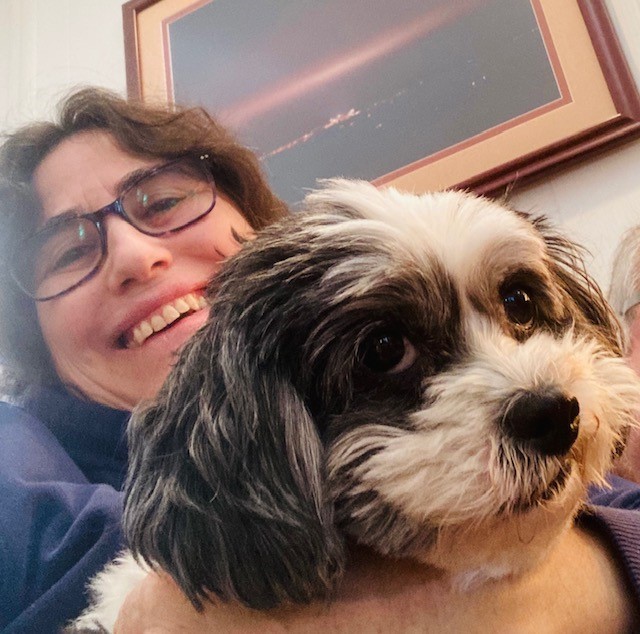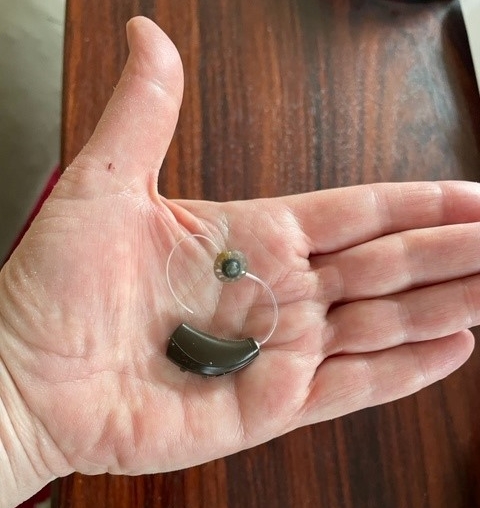This week, FDA closed their public comment period on the proposed over-the-counter hearing aid rule. Later this year, the final rule will be published and hearing aids will be available to adults with mild to moderate hearing loss without the involvement of a professional. While we applaud increasing accessibility for adults with hearing loss, we want to highlight the importance of the hearing care professional. Like in Aimee’s story below, a hearing care professional can help you choose the right device for your needs, be available for troubleshooting, and ensure your world of communication remains open.
I had the pleasure of speaking with Aimee, a friend and member of HIA’s IT team, about her hearing health journey in 2021. After several years of noticing her hearing was diminishing, Aimee finally got fed up with feeling isolated from conversations and decided to seek help.
 “I was riding in the car with my son and daughter-in-law, and while sitting in the back of the car, I couldn’t hear anything that was being said by those in the front” stated Aimee. She marked that moment as when “everything changed. I needed to do something.”
“I was riding in the car with my son and daughter-in-law, and while sitting in the back of the car, I couldn’t hear anything that was being said by those in the front” stated Aimee. She marked that moment as when “everything changed. I needed to do something.”
She described this moment, however, as a long time coming. Around 10 years ago, Aimee had her hearing checked and the results revealed that she was on the borderline of needing a hearing aid. Due to feeling that her hearing was adequate enough and worried about the expense, she waited. It was several years of trying to avoid certain situations, feeling fatigued from trying to listen so hard, and comments from her family that resulted in the first step.
“Honestly, I didn’t know where to turn. Then I learned more from a variety of sources including HIA, and being educated about hearing health made it impossible not to act.”
Aimee sought the help of an audiologist with whom she very quickly felt comfortable. “She’s great,” noted Aimee, who described her hearing testing process as being completely pain free and easier than most other health appointments.
The test results surprised Aimee, who knew she had been struggling in certain situations, but “didn’t realize it was that bad.”
The audiologist asked several questions about Aimee’s lifestyle and needs, and showed her the different styles of hearing aids available. When learning about the behind-the-ear (BTE) rechargeable option, Aimee knew that was the one that would fit her lifestyle.
“Rechargeability means everything”, Aimee decided, as she didn’t want to have to worry about her dexterity and having to change out little batteries.
The audiologist programmed the hearing aids based on the results of Aimee’s hearing test, allowing Aimee to enjoy all the “new” sounds in her environment.
“The thing that got me the most was the birds! They are so loud! I also noticed the ‘ding’ on my oven when it was done baking which I hadn’t heard as loudly before. It was a gradual learning curve, but really it wasn’t that long,” described Aimee.
 Her hearing aids also came with a smartphone app that has various settings to adjust the volume and other features of the devices. There are settings for TV, restaurants, car, and even a mask mode that helps the wearer better understand someone who is speaking through a mask. She can also quickly customize the sound settings on her smartphone if something doesn’t seem just right in a certain situation.
Her hearing aids also came with a smartphone app that has various settings to adjust the volume and other features of the devices. There are settings for TV, restaurants, car, and even a mask mode that helps the wearer better understand someone who is speaking through a mask. She can also quickly customize the sound settings on her smartphone if something doesn’t seem just right in a certain situation.
One aspect of the app that Aimee found helpful was the ‘Find My Hearing Aid’ feature. She was able to use this when retracing her steps and locate her lost hearing aid that was dropped at a pet vet visit. She was grateful for the time and expense saved by this technology’s accessories.
Several months later at a follow-up visit, the audiologist made some final programming adjustments based on Aimee’s experience with her hearing aids. Aimee continues to find her new technology completely worthwhile and an experience that she’d recommend to anyone who has concerns about their hearing.
I asked Aimee about any advice she would give to someone hesitating to get their hearing checked.
“I’d tell them how much better life is right now. I don’t get teased [about not being able to hear]. I can go places and not space out. I feel like I’m not as fatigued by trying to listen so hard. When I would take my dog on a walk outside, I couldn’t hear anything. I knew I wasn’t answering appropriately when others approached me. I can now play on my phone while watching the TV and not have to focus on reading closed captioning. It’s really great, and my kids are happier. I would not hesitate at all.”